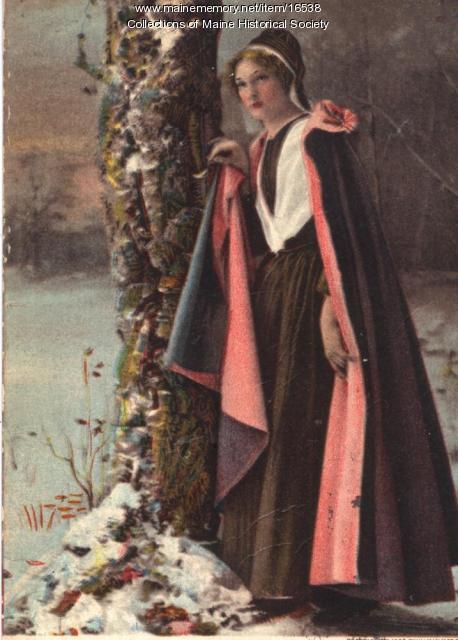Keywords: Acadians
Item 149653
UMFK Acadian Day certificate, Madawaska, 1978
Contributed by: Acadian Archives Date: 1978-06-28 Location: Madawaska; Fort Kent Media: Ink on paper
Item 148631
Acadian Village, Van Buren, ca. 1990
Contributed by: Acadian Archives Date: circa 1990 Location: Van Buren Media: Photographic postcard
Exhibit
The Barns of the St. John River Valley: Maine's Crowning Jewels
Maine's St. John River Valley boasts a unique architectural landscape. A number of historical factors led to the proliferation of a local architectural style, the Madawaska twin barn, as well as a number of building techniques rarely seen elsewhere. Today, these are in danger of being lost to time.
Exhibit
The history of the region now known as Maine did not begin at statehood in 1820. What was Maine before it was a state? How did Maine separate from Massachusetts? How has the Maine we experience today been shaped by thousands of years of history?
Site Page
View collections, facts, and contact information for this Contributing Partner.
Site Page
L'Heritage Vivant Living Heritage
View collections, facts, and contact information for this Contributing Partner.
Story
Mémère’s Notebook
by Robert Sylvain
My Mémère’s Notebook of old Acadian Folksongs
Story
Ah, les Fameuse Ployes!
by Alain Ouellette
Growing up in an Acadian French family and eating ployes
Lesson Plan
Maine's Acadian Community: "Evangeline," Le Grand Dérangement, and Cultural Survival
Grade Level: 9-12
Content Area: English Language Arts, Social Studies
This lesson plan will introduce students to the history of the forced expulsion of thousands of people from Acadia, the Romantic look back at the tragedy in Henry Wadsworth Longfellow's famous epic poem Evangeline and the heroine's adoption as an Acadian cultural figure, and Maine's Acadian community today, along with their relations with Acadian New Brunswick and Nova Scotia residents and others in the Acadian Diaspora. Students will read and discuss primary documents, compare and contrast Le Grand Dérangement to other forced expulsions in Maine history and discuss the significance of cultural survival amidst hardships brought on by treaties, wars, and legislation.
Lesson Plan
Longfellow Studies: The Acadian Diaspora - Reading "Evangeline" as a Feminist and Metaphoric Text
Grade Level: 6-8, 9-12
Content Area: English Language Arts, Social Studies
Evangeline, Longfellow's heroine, has long been read as a search for Evangeline's long-lost love, Gabrielle--separated by the British in 1755 at the time of the Grand Derangement, the Acadian Diaspora. The couple comes to find each other late in life and the story ends. Or does it?
Why does Longfellow choose to tell the story of this cultural group with a woman as the protagonist who is a member of a minority culture the Acadians? Does this say something about Longfellow's ability for understanding the misfortunes of others?
Who is Evangeline searching for? Is it Gabriel, or her long-lost land of Acadia? Does the couple represent that which is lost to them, the land of their birth and rebirth? These are some of the thoughts and ideas which permeate Longfellow's text, Evangeline, beyond the tale of two lovers lost to one another. As the documentary, Evangeline's Quest (see below) states: "The Acadians, the only people to celebrate their defeat." They, as a cultural group, are found in the poem and their story is told.















